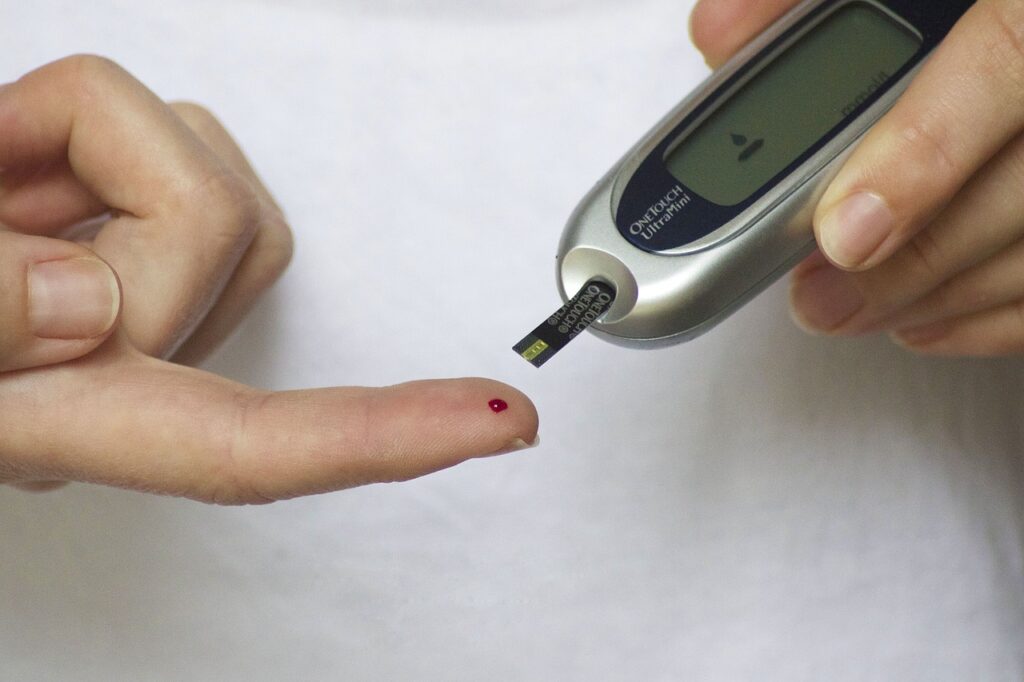Research shows that the Mediterranean diet can help prevent and manage type 2 diabetes and its associated comorbidities.
Most people with type 2 diabetes almost always have at least 1 comorbidity by the time they are diagnosed with this disease. In the United States 98% of adult Americans with type 2 diabetes have at least 1 comorbid condition and almost 90% of them have more than 1. Hypertension, overweight or obesity, hyperlipidemia, and CVD are the most common comorbidities with diabetic patients.
The rate of success in diabetes management will depend on how well you treat these comorbidities. There have been many studies that proves scientifically that the Mediterranean diet can lower the risk of hypertension, overweight or obesity, hyperlipidemia, and CVD (cardiovascular diseases), which are the same morbidities associated with diabetes. As a matter of fact, the US News and World Report concluded that the Mediterranean diet is the Best Diet for Diabetes when they ranked different diets back in 2018.
In this article, we will talk about how the Mediterranean diet will prevent and manage diabetes-related comorbidities and provide nutritional strategies for people who follow this eating pattern.
The Mediterranean diet is a diet plan that has been proven effective at improving CVD risk factors like elevated lipids, blood pressure, and triglycerides in people with diabetes. This diet plan focuses more on lots of fruits and vegetables in a typical meal plate, breads and other forms of cereals are also recommended, beans, nuts, seeds, and unprocessed, farm fresh, and locally grown foods. Its main source of fat is olive oil, feta cheese and Greek yogurt are the preferred dairy products and is only consumed at low to moderate amounts, and no more than 4 eggs are consumed. Eating red meat is looked down upon and if you really want to eat red meat, then it is advised that you only consume it in small amounts. Drinking a glass of red wine at least once a day is also recommended.
What is the Mediterranean Diet?
The Mediterranean diet is an ancient eating pattern developed by countries surrounding the Mediterranean Sea – including Greece, Spain and Southern Italy. The cuisines included in this diet are vast spanning 21 countries, so there’s a lot to choose from and it’s also non-restrictive. The typical plate served in these countries is heavy in fruits and vegetables, fish and seafood, whole grain breads, red wine, rice and pasta. Red meat is discouraged from being consumed in this diet program, while olive oil is used in place of butter and salt with herbs and spices. Food is fresh and almost unprocessed and it’s also cooked lightly to keep it fresh in order for the body to absorb its nutrients efficiently.
Does the Mediterranean Diet Help Control Type 2 Diabetes?
People with type 2 diabetes should choose to adopt a diet plan that has an impact on weight loss and carb intake. It is now a known fact that the Mediterranean diet is almost as good as intermittent fasting when it comes to low carb consumption and weight loss. The Mediterranean diet is low in refined sugars and oils, butter, processed meats (and processed foods in general). If you’ll notice, all these food mentioned above are what doctors advise diabetic patients to avoid completely. With 21 countries’ cuisines that comprise the entirety of the Mediterranean diet you’ll have plenty of alternatives that will ensure you avoid the foods that your doctor warned you about. Yes, as unbelievable as this may sound almost all foods in the Mediterranean diet is that healthy! But be aware that there are certain foods in this diet that when consumed indiscriminately can increase your carb intake. Those include carbohydrate-heavy dishes such as pasta, potatoes and rice. But you can replace these with brown rice or whole grain pasta and you no longer have to worry about the carbs you’ll consume.
Aside from being a champion at weight loss and the reduction of carb intake, the Mediterranean diet is also very good at fighting and preventing several chronic illnesses. Its most notable achievement is significantly reducing the risk of cardiovascular diseases (CVD). One could argue that the Mediterranean diet is a “heart smart” diet,” because type 2 diabetes patients are potentially at risk of developing CVD. This disease-preventing factor is yet another reason to adapt the Mediterranean diet and live a healthy lifestyle.
Managing the Comorbidities
Kelly Toups, MLA, RD, LDN, director of nutrition at Oldways, a nonprofit food and nutrition education organization in Boston said that it is not a coincidence that the US News and World Report made the Mediterranean Diet the No. 1 Best Diet for Diabetes in its 2018 rankings (besides making it the Best Overall Diet in the world along with the DASH diet [Dietary Approaches to Stop Hypertension]). Studies proved that the Mediterranean diet essentially reduces the risk of diabetes comorbidities such as hypertension and dyslipidemia. In fact, in a 2013 evidence-based study of the American Diabetes Association’s (ADA), they determined that the Mediterranean diet should be recommended to all Nutrition Therapy Recommendations for the Management of Adults with Type 3 Diabetes. It is still the recommended diet to this day and has been included in the 2018 ADA Standards of Medical Care in Diabetes.
Hypertension, Hyperlipidemia, and CVD
Uncontrolled hypertension increases the risk of developing myocardial infarction, retinopathy, and nephropathy. In the United States about 33% of the type diabetes population (with hypertension) are able to bring their hypertension under control. In order for you to manage your diabetes properly, you must be able to control your blood glucose level and you lipids. Medical experts agree that lowering your blood pressure is detrimental to the morbidity and mortality in diabetic patients. According to multiple studies the Mediterranean diet is very efficient in reducing blood pressure.
The American Journal of Clinical Nutrition published a research in 2017 where 166 elderly Australian adults were selected as their test subjects. They separated into 2 groups where Group A was required to follow the Mediterranean diet for 6 months, while Group B was allowed to consume their regular habitual diet. By the end of the study, the researchers found that Group A showed a significantly lower systolic blood pressure and improved functioning of endothelial cells, whereas Group B’s figures remained the same.
Toups also noted that pregnant women who have been diagnosed with gestational diabetes can take advantage of the Mediterranean diet’s benefits. In a study published in the journal called Hypertension, scientists studied and recorded the eating patterns and health conditions of more than 3,800 women who were diagnosed with gestational diabetes at a prior time. The study lasted for 18 years and the results were astounding! The researchers found that those women who followed the Mediterranean diet had a 30% lower risk of developing high blood pressure compared to the other women in the study (the final results were adjusted for BMI, age, and other demographic factors).
These studies and other recent evidence continue to show the therapeutic value of the Mediterranean diet in reducing CVD risk factors. A comprehensive review was published in the European Journal of Clinical Nutrition in 2016 where researchers conducted a meta-analysis of randomized controlled trials in order to find out how the Mediterranean diet affects glycemic control, weight loss, and cardiovascular risk factors in people with type 2 diabetes. There are 9 independent studies included in the meta-analysis, which had a total of 1,178 patients. The patients that followed the Mediterranean diet showed a lower total cholesterol, triglycerides, and blood pressure, higher HDL cholesterol, improved blood sugar control (i.e. hemoglobin A1c, fasting glucose, and fasting insulin), improved BMI, and weight loss than those who just had a controlled diet.
In addition to increasing HDL cholesterol, it has been shown that the Mediterranean diet also improved how HDL cholesterol functioned. In 2017 a study was conducted in which people at risk of heart disease were asked to follow 3 distinct diet patterns, which were;
- Mediterranean diet with nuts
- Mediterranean diet with olive oil
- Low-fat diet
They found that all 3 diets increased HDL cholesterol; however, only the 2 Mediterranean diet regimens showed improvement on how well the HDL cholesterol transported out the LDL cholesterol. Meanwhile, the Mediterranean diet with olive oil in particular showed improved HDL antioxidant properties and improved blood vessel protection.
Overweight and Obesity
Almost 90% of diabetic patients in America are either overweight or obese according to the 2017 National Diabetes Statistics Report. Studies consistently show that even just losing less than 10 pounds from your weight can have a positive impact in your health, which includes reductions in blood glucose, A1c, and triglycerides. There is a clear link between the Mediterranean diet and weight loss, as well as improvements in A1c that persist at 12 months.
In a systematic review of the Mediterranean diet for long-term weight loss, 5 controlled trials that was randomized pit the Mediterranean diet against 3 other diet patterns;
- Low-fat diet
- Low-carb diet
- ADA diet
The participants that ate food from the Mediterranean diet lost between 9 and 22 lbs., which in the same ball park figure as the low-carb and ADA diets. However, those that followed the low-fat diet had a lower weight loss rate compared to the first group, which was only between 6 and 11 lbs. Test subjects with type 2 diabetes on the Mediterranean diet also showed a significant improvement in their blood sugar control compared to the participants in the other diet categories. Still, the Mediterranean diet got a tie score with the other diets when it comes to improving other CVD risk factors, including blood pressure and lipid levels.
How the Mediterranean Cuisine can help Manage Type 2 Diabetes
Aside from having the capacity to improve and reduce the risk of diabetes comorbidities, the Mediterranean diet also helps reduce the risk of developing diabetes and preventing long-term complications such as retinopathy. According to Jennifer McDaniel, MS, RDN, owner of McDaniel Nutrition Therapy in St. Louis, author of Prevention Mediterranean Table: 100 Vibrant Recipes to Savor and Share for Lifelong Health, and a national spokesperson for the Academy of Nutrition and Dietetics said that the typical foods in the Mediterranean diet such as vegetables, fruits, whole grains, nuts, and seeds are rich in fiber and helps you achieve an ideal weight/BMI and stabilizes your blood sugar level. In fact, a certain study that was published in the Metabolism journal, which studied the health of almost 137,000 adults, concluded that if people will follow the Mediterranean diet, then they will have a 23% risk reduction in developing type 2 diabetes. Wine and extra virgin olive oil (EVOO) are also known to help decrease the risk of developing type 2 diabetes.
In a study published in Nutrition & Diabetes, scientists did a meta-analysis on 4 different studies and 29 clinical trials and discovered that people who consumed more olive oil had a 16% chance lesser risk of developing type 2 diabetes compared to those who consume it less, and if you consume just 2 teaspoon of olive oil everyday will increase your chances of not getting type 2 diabetes by 9 percent. Meanwhile, in people who already type 2 diabetes, their HbA1c drops down significantly when they include olive oil to their diet. The Mediterranean diet, especially in foods cooked with olive oil, it seems to show some protective properties for diabetic retinopathy. Based on the PREDIMED study data, it shows that you will have a 43% decreased risk of diabetic retinopathy if you follow the Mediterranean diet with olive oil (which is better than with the results of a low-fat diet).
Toups said that red wine is not only one of the most popular aspects of the Mediterranean diet, there’s also enough evidence that suggests it has certain benefits that’s good for people with diabetes. Another research that was published in the Journal of Diabetes Investigation showed a 15% decreased risk of type 2 diabetes when you drink wine. Researchers also noted that drinking wine (no matter what kind) of up to 3 ounces per day (the highest average of the participants) helps protect against developing type 2 diabetes. On the other hand drinking beer (over 3 ounces per day) and spirits (more than 23 g per day, or less than 1 ounce) shows a higher risk of developing type 2 diabetes.
Meal Planning Made Easy
The Mediterranean diet is one of the 3 diets in the USDA’s eating pattern recommendation in the 2015–2020 Dietary Guidelines for Americans. Oldways with the help of Harvard School of Public Health, developed the Mediterranean Diet Pyramid in order to help the everyday average American to adopt the Mediterranean diet into their lifestyles easily. Vegetables, legumes, whole grains, nuts, seeds, olive oil, fruit, herbs, and spices are the foundation of every meal in the Mediterranean Diet Pyramid. It also emphasizes the need for physical activity and social interactions, especially when sharing meals with other people. Seafood, traditional cheeses and yogurts are regularly used, albeit in small amounts. Sweets are only consumed when there are special occasions (weddings or religious celebrations), otherwise it’s not a food priority. On the other hand the beverages of choice are water or wine, but are recommended to consume moderately (especially wine).
Aside from creating the Mediterranean Diet Pyramid, Oldways also came up with other resources for the Mediterranean diet like the Med diet grocery list, four-week Med Diet Menu Plan Book, and a Med diet food glossary. Toups uses these resources together with the Mediterranean Diet Pyramid in order to show her patients that eating vegetables is not all that dull and it can be fun and delicious to enjoy meals from the Mediterranean diet.
The following are two examples of her diet formulas:
- Dinner Formula – 2 servings of non-starchy vegetables, 1 serving of whole grains and 1 serving of fish. For instance, you can prepare salmon with bulgur salad and broccoli that’s roasted in olive oil, or sea bass on top of a small bowl of farro risotto and oil massaged kale salad with shaved Parmigiano-Reggiano.
- Snack Formula – pair 1 serving of artisan cheese or nuts with 1 serving of fresh fruit. For example, you can pair 1 fresh pear fruit with an ounce of walnuts or Parmigiano-Reggiano, or 2-3 figs paired with 1 ounce of pistachios, feta cheese or sheep’s milk.
Diabetic patients will benefit most from these meal formulas, because they can get the fat and protein from the nuts and/or cheese, while the fruit is rich in fiber yet will not spike the blood sugar as rapidly.
Bottom Line
The FDA, USDA, WHO and other health groups has not recommended any standardized meal plan for diabetes. However, almost any health expert will agree that the evidence for the Mediterranean diet having the capability to prevent and manage type 2 diabetes and its associated comorbidities is undeniable, and should definitely be the recommended standard meal plan for people with diabetes.








25 Responses
I have type 2 diabetes and this article really helped me find the information I need to manage my illness. Thank you!
At this time I am going away to do my breakfast,
when having my breakfast coming yet again to read further
news.
Your phrase, simply charm
Very interesting phrase
Woah! I’m really loving the template/theme of this blog. It’s simple, yet effective. A lot of times it’s very hard to get that “perfect balance” between usability and appearance. I must say you have done a fantastic job with this. In addition, the blog loads super fast for me on Opera. Exceptional Blog!
It agree, very useful idea
Quite good topic
Loving the info on this web site, you have done great job on the blog posts.
Thank you
Thank you
Great
Thanks
Great post
Great
Great post
Great post
Thank you
This is a remarkable task. I actually appreciate your work! So precise and specialist. Thank you a lot for your hard work. There was a small blunder, but overall I was satisfied. There was a small blunder, but overall I was pleased. Many thanks a great deal! Excellent creating thanks it was clear as well as was created as the guidelines as well as with great Examination Help Online recommendation
This is an outstanding project. I actually value your job! So exact and specialist. Thank you a lot for your hard work. There was a small blunder, yet total I was satisfied. There was a minor mistake, but total I was pleased. Many thanks a whole lot! Excellent creating thanks it was clear as well as was composed as the instructions.
Great article! I will definitely share this with my friends who are diabetic. Keep up the good work.
Wow! Very comprehensive and informative. I’ll give the Mediterranean diet a try and see how it works on my body. Hope my blood sugar will drop even in just small amounts.
I never thought that there would be a simple remedy to lower my blood sugar level, but here it is! Thanks for this article.
Really enjoyed this blog article.Much thanks again. Cool.
What a nice website, cannot wait to read new articles.
Your phrase is very good